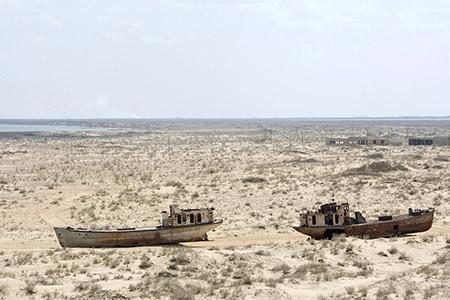CLIMATE CHANGE
One of the most pressing issues of our time, climate change threatens the lives and livelihoods of billions of people. Natural disasters, environmental degradation and extreme weather patterns disrupt harvests, deplete fisheries, erode livelihoods and spur infectious diseases. Demographic trends, migration and rapid urbanization converge with climate change, raising the stakes for those most vulnerable.
Climate change is also a “threat multiplier.” The loss of land and livelihoods, against a backdrop of persistent poverty, displacement and other insecurities, can trigger competition for scarce natural resources and fuel social tensions. The complex and interrelated causes and consequences of climate change require comprehensive, integrated strategies that identify entry points for collaborative action to mitigate its impacts on people and communities.
REDUCING THE IMPACTS THROUGH PEOPLE-CENTRED ACTION
By placing people at the centre, the human security approach encourages broad participation that provides detailed insights into the varying challenges faced by different groups within communities and regions. Such an approach allows for more targeted and community-driven solutions that address immediate vulnerabilities while also building resilience and protecting livelihoods in the long-term. Through supporting community actions, the human security approach aims to reduce disaster risks, make sustainable and fair use of environmental resources, and foster peaceful, prosperous societies.
The human security framework helps international, national and local actors to better coordinate responses to climate change. As many of its drivers go beyond the response capacity of individuals and communities, partnerships are essential to tempering impacts, reducing vulnerabilities, and sustaining political commitment. Community-based adaptation and mitigation plans can also make crucial contributions to national and international strategies, and can support early warning mechanisms that inform proactive and preventive measures.
APPLYING HUMAN SECURITY TO CLIMATE CHANGE
Human security programmes have advanced in-depth analysis of the local context to understand the multidimensional consequences of climate change and its impact on the severity and distribution of risks and vulnerabilities within countries. Programmes promote comprehensive responses that address the social, economic and environmental impacts, help tailor disaster mitigation strategies to local capacities and resources, and ensure local engagement in resilience-building efforts.
Highlighted Story
Uzbekistan: Sustaining livelihoods affected by the Aral Sea disaster

A view of rusted, abandoned ships in Muynak, Uzebkistan, a former port city whose population has declined precipitously with the rapid recession of the Aral Sea. UN Photo/Eskinder Debebe
Once the fourth largest lake in the world, the loss of the Aral Sea had devastating consequences on the lives and livelihoods of local populations. Income poverty, growing salinization of land and water, lack of food security, and exposure to dust storms was forcing many to relocate. Since the causes of the disaster were complex and interconnected, the UNTFHS programme brought together multiple UN entities and capitalised on the expertise of local and national stakeholders. The programme resulted in more resilient communities and enhanced development prospects through locally-relevant mitigation and adaptation strategies in employment, environmental management, food security and healthcare.
